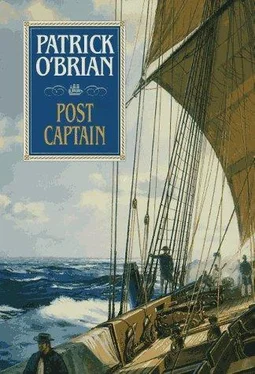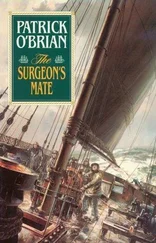Patrick O'Brian - Post captain
Здесь есть возможность читать онлайн «Patrick O'Brian - Post captain» весь текст электронной книги совершенно бесплатно (целиком полную версию без сокращений). В некоторых случаях можно слушать аудио, скачать через торрент в формате fb2 и присутствует краткое содержание. Жанр: Книги. Описание произведения, (предисловие) а так же отзывы посетителей доступны на портале библиотеки ЛибКат.
- Название:Post captain
- Автор:
- Жанр:
- Год:неизвестен
- ISBN:нет данных
- Рейтинг книги:5 / 5. Голосов: 1
-
Избранное:Добавить в избранное
- Отзывы:
-
Ваша оценка:
- 100
- 1
- 2
- 3
- 4
- 5
Post captain: краткое содержание, описание и аннотация
Предлагаем к чтению аннотацию, описание, краткое содержание или предисловие (зависит от того, что написал сам автор книги «Post captain»). Если вы не нашли необходимую информацию о книге — напишите в комментариях, мы постараемся отыскать её.
Post captain — читать онлайн бесплатно полную книгу (весь текст) целиком
Ниже представлен текст книги, разбитый по страницам. Система сохранения места последней прочитанной страницы, позволяет с удобством читать онлайн бесплатно книгу «Post captain», без необходимости каждый раз заново искать на чём Вы остановились. Поставьте закладку, и сможете в любой момент перейти на страницу, на которой закончили чтение.
Интервал:
Закладка:
Jack sat heavily on the stone, gasping inwards, filling his starved lungs. Some reality other than general suffering returned. ‘Wolf’s pissing-post: oh, yes.’ In front of him the ground fell suddenly - almost a precipice - two thousand feet below there was Spanish Catalonia spread out in the morning light. A high-towered castle just below them on a jutting rock - a lobbed stone would reach it; the Pyrenees folded away and away in long fingers to the plain; square distant fields, vineyards green; a shining river winding left-handed towards the great sweep of the sea; the Bay of Rosas with Cap Creus at the far northern end - home water, and now the hot wind smelt of salt.
‘I am happy you were pleased with your wolf,’ he said at last in a sleep-walker’s voice. ‘There are - they are uncommon rare, I dare say.’
‘Not at all, my dear. We have them by the score - can never leave the sheep by night. No. Her presence means we are alone. That is why I rejoice. I rejoice. Even so, I think we should go down to the spring: it is under the chestnuts, those chestnuts not two minutes down. That wolfess may be a fool - see her now, moving among the junipers - and I should not wish to fail, just when we have succeeded. Some chance cross-patrol, douaniers rather than soldiers, some zealous sergeant with a carabine. Can you get up? God help me, I hardly can.’
The spring, Jack wallowing in it, cold water and grit sweeping off the crass, the stream running filthy, but coming fresh and fresh straight from the rock. Jack luxuriating, drying in the wind, plunging again and again. His body was dead white where it was not cruelly galled, bitten, rasped; his colourless face puffy, sweat-swollen, corpse-like, a tangled yellow beard covering his mouth; his eyes were red and pustulent. But there was life in them, brilliant delight blazing through the physical distress.
‘You have lost between three and four stone,’ observed Stephen, appraising his loins and belly.
‘I am sure you are right,’ said Jack. ‘And nine parts of it is in this vile skin, a good three stone of human grease.’ He kicked the limp bear with his bleeding foot, damned it once or twice for a son of a bitch, and observed he must take the papers out before setting it alight. ‘How it will stink - how it does stink, by God. Just hand me along the scissors, Stephen, pray.’
‘The bear may serve again,’ said Stephen. ‘Let us roll it up and thrust it under the bush. I will send for it from the house.’
‘Is the house a great way off?’
‘Why no,’ said Stephen, pointing to the castle. ‘It is just there below us, a thousand feet or so - to the right of the white scar, the marble quarry. Though I am afraid it will take us an hour to get there - an hour to breakfast.’
‘Is that castle yours, Stephen?’
‘It is. And this is my sheepwalk. What is more,’ he said, looking sharply at the cowpats, ‘I believe those French dogs from La Vaill have been sending their cattle over to eat my grass.’
CHAPTER FIVEThree days after crossing the tropic the Lord Nelson East-Indiaman, Captain Spottiswood, homeward-bound from Bombay, broached to in a westerly gale; the ship survived, but she lost her maintopmast and its topgallant, carried away her mizen just above the cap, sprang her fore and main masts, and damaged her rigging to an extraordinary extent. She also lost her boats upon the booms and most of the booms themselves; so, the wind being foul for Madeira, the passengers in a state of panic and the crew near mutiny after a very long and uniformly disagreeable voyage, Mr Spottiswood bore away for Gibraltar, right under his lee, although like all homeward-bound captains he was very unwilling to put into a naval port. As he had expected, he lost many of his English-born sailormen to the press, all prime hands; but he did repair his ship, and as some meagre consolation he did embark a few passengers.
The first to come aboard were Jack Aubrey and Stephen Maturin; they were received by the captain at the head of his officers in some style, for the Company possessed, or at least arrogated to itself, a particular status, and its ships adopted many of the ways of the Royal Navy. There were sensible reasons for some of these - the chequered gun-ports, for instance, and the general appearance of regularity had persuaded many an enemy cruiser that he had to do with a man-of-war and that he had better look elsewhere -but there were many little pretensions that vexed the real Navy, and King’s officers aboard a Company ship were apt to look about them with a carping eye. In this case a critic could have found fault straight away: in spite of the black side-boys in their white gloves, the reception
was incorrect - that vague huddle of figures would never have done aboard the Superb, for example, in which Jack had dined, and whose hospitality was still ringing in his head, although he could walk straight. Furthermore, he was conscious of a huge grin from the midst of that same huddle, a kind of half-determined nodding and becking, a bashfulness accompanied by familiarity that brought a hint of stiffness into his expression. He spoke with particular civility to Captain Spottiswood, who privately damned him for his condescension, and then turning he recognized the stare.
‘Why, Pullings!’ he cried, all his ill-humour - a very slight ill-humour in any case - vanishing at once and the hard lines of his face dissolving into a delighted smile. ‘How happy I am to see you! How do you do? How are you coming along, eh? Eh?’
‘And this is our supercargo, Mr Jennings,’ said Captain Spottiswood, not best pleased at having his regular sequence changed. ‘Mr Bates. Mr Wand. Mr Pullings you already know, I see.’
‘We were shipmates,’ said Jack, shaking Pullings’s hand with a force in direct proportion to his affection for the young man, a former master’s mate and acting-lieutenant in the Sophie, who was now beaming over his shoulder at Dr Maturin.
The Lord Nelson had never been a happy or a fortunate ship, but within an hour of taking her passengers on board a brisk Levanter sprang up to carry her right out through the strong current of the Gut and into the full Atlantic; and poor Captain Spottiswood, in the innocence of his heart, reckoned this a great stroke of luck - a good omen at last, perhaps. She was not a very comely ship, either, nor much of a sailer: comfortable for the passengers, roomy for her cargo, certainly; but crank, slow in stays, and near the end of her useful life. This was, in fact, to be her last voyage, and even for her trip in 1801 the underwriters had insisted upon an extra thirty shillings per cent.
It also happened that she was the first Indiaman Jack had ever sailed in, and as he walked about with Pullings during his watch below he gazed with astonishment at the general lumber of the deck and at the casks and water-butts lashed between the guns. Twenty eighteen-pounders and six twelves: an imposing show of force for a merchantman. ‘And how many people have you aboard?’ he asked.
‘Just above a hundred now, sir. A hundred and two, to be exact.’
‘Well, well, well,’ said Jack. in the Navy they did not think nine men and a powder-boy too much for an eighteen-pounder, seven and a boy for the twelves: a hundred and twenty-four men to fight the guns one side -a hundred and twenty-four beef- and pork-fed Englishmen, and another hundred to trim the sails, work the ship, repel boarders, ply the small arms, and fight the other side on occasion. He glanced at the Lascars squatting around their heap of junk, working under the orders of their turbanned serang; they might be tolerably good seamen in their way, perhaps, but they were very slight, and he could not see five or six of them running out a two-ton gun against the Atlantic roll. This impression of smallness was increased by the fact that most of them were cold; the few European members of the crew were in their shirts, but several of the Lascars had pea-jackets on as well, and all had a blueish tinge in their dark complexions.
Читать дальшеИнтервал:
Закладка:
Похожие книги на «Post captain»
Представляем Вашему вниманию похожие книги на «Post captain» списком для выбора. Мы отобрали схожую по названию и смыслу литературу в надежде предоставить читателям больше вариантов отыскать новые, интересные, ещё непрочитанные произведения.
Обсуждение, отзывы о книге «Post captain» и просто собственные мнения читателей. Оставьте ваши комментарии, напишите, что Вы думаете о произведении, его смысле или главных героях. Укажите что конкретно понравилось, а что нет, и почему Вы так считаете.












